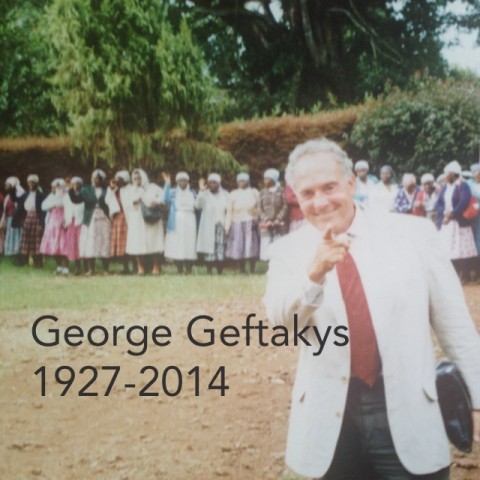A time to mourn
Sunday, August 10th was a perfect Southern California day. It was the kind of day you spend driving over the Coronado Bay Bridge—blue water sparkling below and navy warships all lined up in a row. It’s the kind of day you spend browsing quaint shops, walking the beach and later, sipping cool drinks by the pool. And that is what I did. It wasn't the kind of day I expected to get a call saying my grandfather, George Geftakys--founder of The Assembly--had died.
How to make sense of a death that left so many things unresolved? How to mourn the loss of flesh and blood--this brilliant yet deeply flawed man who led me to Jesus but also ushered much pain into my life..and the lives of others? How to grapple with the death of a family member while also acknowledging the public legacy of pain he left behind? This past week has been full of conflicting emotions, to say the least.
I knew his death was coming—he’d had a stroke in April, hospice had been called. He was descending quickly, his mind failing him. Still, his death still felt unexpected if only because I told myself he wouldn’t die before making things right with all of us. I’d kept that faint spark of hope alive...
And now, the spark has gone out.
The day he died, I'd felt a growing unease. Despite the beautiful weather, the view from the bridge and the warm sunshine of San Diego a band of pain squeezed my temples and then, just before dinner, I suddenly lost my appetite. Around six o’ clock I needed to lie down.
I wouldn’t know it until later, but at just that moment my grandfather, George Geftakys, was drawing his last breaths.
My grandfather is dead and I am surprised by the intensity of this grief. I weep for all that was good--and yes, there was GOOD. I weep for all that could have been and wasn’t, all that went unresolved and I especially weep for the light that turned to darkness.
I weep because, in the end, he was still my flesh and blood. And I am still, in some ways, the little girl he called “darling”—his eldest grandchild who was able to delight him by quoting poetry or articulating the major points from his sermons.
I went through some old pictures this week and remembered his great, booming PRAISE THE LORDs as he barreled into a crowded room. I remembered the uproarious laughter, the way he would throw his head back, sweep off his glasses and howl with abandon. I remember feeling awestruck in his presence and trembling with a kind of frightened inspiration. He had such an oversized personality and such a grand vision for God’s work in the world. He was intense and charismatic. From him I developed a love of books and learning, a passion for the written word.
But I also remember the creeping darkness, the web of lies, the compartmentalization, the way he could deny, deny, deny no matter what facts stated otherwise. This is the paradox of my grief: to untangle the good from the bad.
In viewing my grandfather’s legacy, it is difficult to refrain from defining him by his failures. There was much good in The Assembly. God's Word was clearly preached. Many were saved. We learned and studied our Bibles. We experienced deep friendships. Do mistakes and failures erase the good? I hope not. But when those mistakes are never accounted for, when open wounds are never bound up--well, that unresolved pain is part of his legacy and I suppose that's what grieves me most. It didn’t have to end this way.
Ultimately, I believe God is both just and merciful. This faith allows me to rest my grief and unresolved pain at the foot of the Cross and to place my trust in the merciful love of God, believing that one day He will wipe away our tears and make all things work together for good. Until then...
Requiescat en pace, Papa.
